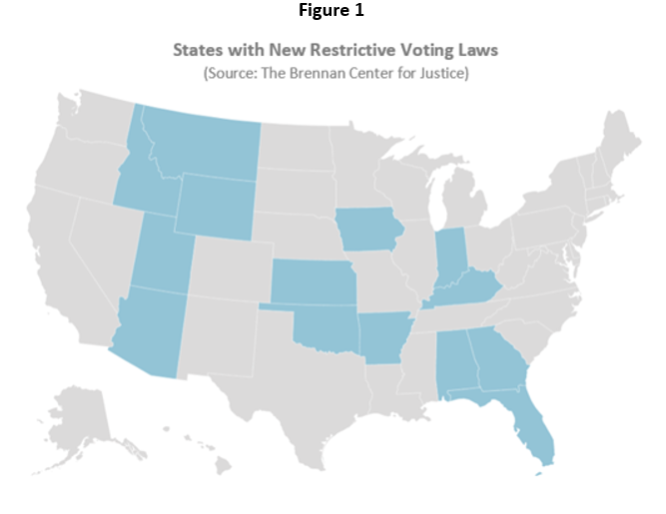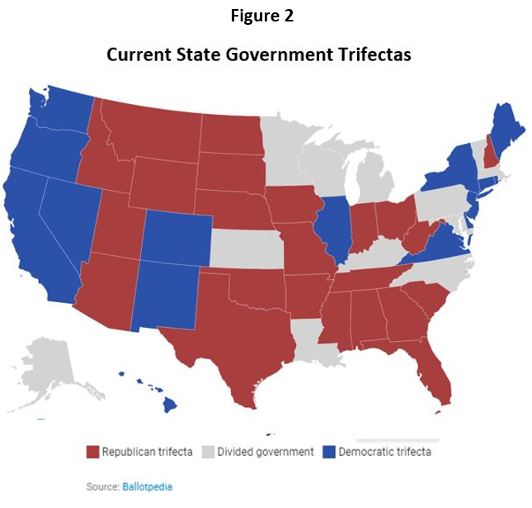Voting Rights and Climate Policy—Not as Odd a Couple as You Might Think


· 6 min read
Why voting rights?
There two places where voting rights legislation impacts climate policy. The first place is at the state level. As reported by the Brennan Center, 14 states have already enacted 22 new laws restricting access to the vote. (See Figure 1) According to the Center, 61 bills with restrictive provisions are moving through the 18 legislatures still in session. More specifically:
…31 [bills] have passed at least one chamber, while another 30 have had some sort of committee action (e.g., a hearing, an amendment, or a committee vote). Overall, lawmakers have introduced at least 389 restrictive bills in 48 states in the 2021 legislative sessions.
The reason so many voter-restriction bills have been proposed and acted upon is —in large measure—to give “meaning” to former President Trump’s lie that he won the 2020 election. It is a delusory claim that failed to convince any court—including the newly conservative US Supreme Court—ruling in the 60 lawsuits brought by Trump and his allies to invalidate the November presidential election.

With the conclusion of the decennial census, state legislatures will begin redrawing the boundary lines of electoral districts, i.e., those for Congress and the state legislatures themselves. Of the 50 states, 38 are considered trifectas. A trifecta is when a single political party controls the governor’s office and both chambers of the state legislature.
There are currently 23 Republican trifecta states and 15 Democratic. (See Figure 2). Where they can, ruling state parties—Republican or Democratic—will draw the voting district boundaries in a manner beneficial to it. Since the US Supreme Court’s decision in Rucho v. Common Cause, federal courts are powerless to hear challenges to partisan gerrymandering.
The For the People Act of 2021 would prohibit gerrymandering. Moreover, should it become law, the Act would offset the newly passed restrictions in the 14 states that have written them into their election laws and dissuade the other states from enacting similar provisions.
Although generalizations can be loathsome, they can also be correct. The fact is that Republicans—especially Trump Republicans—are much less likely to believe that climate change is real or largely the fault of fossil fuels. It is an opinion played out in the resistance to climate-related policies in many red states and at the federal level by the opposition of red-state senators and representatives to President Biden’s aggressive environmental agenda.
The second place the voting rights Act will impact national climate policy is within the Senate itself because of what it might lead to as a matter of Senate procedure. Bear with me for a moment and it will come clear.
Much depends upon Senator Joe Manchin (D-WV). Yes, the same senator on whose shoulders rests the fate of President Biden’s climate, infrastructure agendas—as well as the Senate’s filibuster rule.

In fairness, I should include Senator Sinema’s (D-AZ) shoulders in the matters of infrastructure, climate, and any changes to the filibuster rule. Sinema, however, has indicated her support of the voting rights Act as a cosponsor.
Manchin remains the only Senate Democrat who remains opposed to the Act as it was introduced. However, he has voiced what he believes to be the elements of a voting rights act that he could support. His list of desired reforms includes many of the provisions contained in the original 800- page Act. These include mandates making election day a federal holiday, prohibiting state gerrymandering, automatic registration through Divisions of Motor Vehicles, with the option to opt-out, and requiring states to promote access to voter registration and voting for persons with disabilities and older individuals. Stacy Abrams has endorsed Manchin’s proposals.
Abrams is a former Georgia state legislative leader and gubernatorial candidate. She is an influential figure among Democrats as she is given much of the credit for delivering Georgia for President Biden. Vogue named her The Most Influential Woman of 2021 just as the year was beginning.
Ms. Abrams’s endorsement of Manchin’s compromise has given it cachet that it might otherwise lack. It appears that Senate and House Democrats are willing to accept Manchin’s changes to the original bill that passed the House largely along partisan lines.
Unanimous Democratic support does not guarantee the bill will be brought up for debate and a vote by the upper chamber—far from it. For that to happen an additional ten Republican votes would be needed—not for the passage of the bill but to end the Republican filibuster. The likelihood of that happening is—ZILCH!
So, why is Manchin’s making the Democratic vote unanimous so important? Think of it as kabuki intended to convey the message that Republicans in Congress are intent on pleasing the former president and punishing voters in the states he lost in the 2020 election. A unanimous Democratic showing denies Republicans any opportunity to claim that the leading moderate Democrat sees the Act as part of a progressive plot to turn the country socialist.
Realistically, voting rights are an issue the Democrats believe will resonate with moderate voters in 2022—particularly with educated suburbanites and voters of color who tipped the scales in the 2020 presidential election. After all, the right to vote is fundamental to democracy.
Manchin’s willingness to find a way of joining with his Senate colleagues on a bill he said he wouldn’t support holds out some hope that he will do the same in the case the filibuster. The same procedure that is preventing his compromise bill from any of becoming law.
Whatever else may be said of Manchin, he has expended a lot of political capital in trying to bring Republicans and Democrats together in a bipartisan approach to governance—only to be rebuffed by McConnell and company for doing what they kinda, sorta suggested they would do if their concerns were addressed.
A case in point was the proposed bipartisan January 6th Commission to investigate the assault on the Capitol that was passed in House. Manchin described a conversation he had with Minority Leader McConnell about the Commission this way:
I said, ‘Mitch, I need your help on this; I can’t continue to do it all by myself.’ And he said, ‘Joe, that’sjust not good for our politics.
By our politics, McConnell meant Republicans.
Schumer and others are waiting for Manchin to grow frustrated enough with Republicans who say they will, and then they don’t—frustrated enough that he will be willing to accept some changes in the Senate filibuster rule. Should Manchin soften his stance on the filibuster, there remains Sinema to convince, which may prove futile given her recent editorial. For Schumer, House Speaker Pelosi, and President Biden it’s one step at a time.
The bottom line in all of this is that any real chance for a national, integrated energy and environment policy appears to be unilateral action by congressional Democrats. The two rarest commodities in the nation’s capital these days are bipartisanship and time. I worry that in the pursuit of one, the other is wasted.
With few exceptions like the American Rescue Plan Act andJuneteenth National Independence Day Act, bipartisan agreements have been few and far between. Once the ball drops and the bell rung to bring in the new year, the race to the midterm elections will be on in earnest, and bipartisan agreements will grow fewer and further apart. It’s the sad state of today’s politics.
Gokul Shekar

Effects · Climate Change
illuminem briefings

Mitigation · Climate Change
illuminem briefings

Climate Change · Environmental Sustainability
Financial Times

Carbon Market · Public Governance
The Guardian

Agriculture · Climate Change
Euronews

Climate Change · Effects